The Convenience Store (no gas)
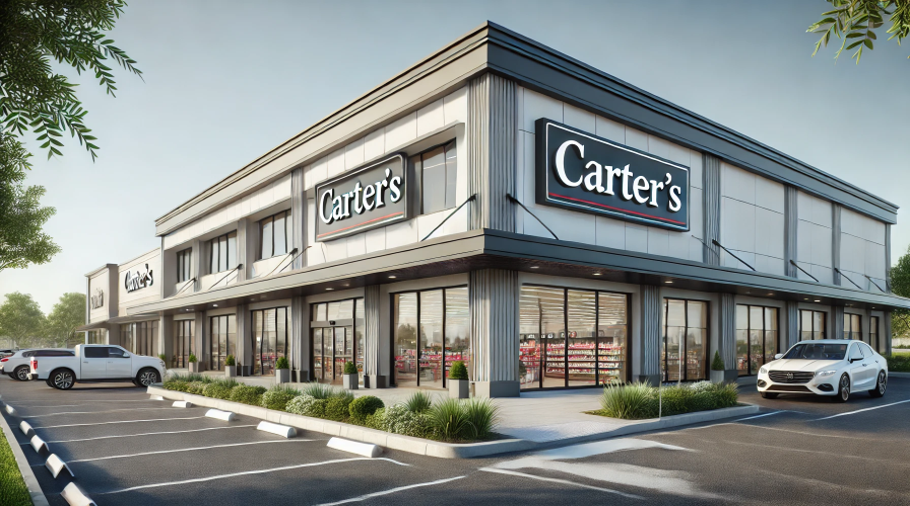
A convenience store without gasoline services is a small retail outlet that provides quick and easy access to a variety of everyday products and essentials, typically catering to on-the-go customers. These stores are often located in urban areas, neighborhoods, or within larger buildings like office complexes or apartment buildings. They focus on offering a curated selection of items such as snacks, beverages, grab-and-go meals, personal care products, and household necessities. Unlike traditional convenience stores with gas stations, these stores do not include fuel services, allowing them to focus entirely on creating a seamless and efficient shopping experience. Their compact size, extended operating hours, and strategic placement make them a convenient option for customers seeking fast and accessible retail solutions.
Convenience store chains without gasoline services are a significant segment of the retail market, dominated by well-known brands like 7-Eleven and Circle K in many regions. These chains focus on densely populated urban and suburban areas, catering to commuters, pedestrians, and residents who prioritize speed and convenience over fuel services. 7-Eleven, a global leader, operates thousands of stores worldwide, offering everything from snacks and beverages to prepared foods and essential groceries, all within a compact footprint. Similarly, Circle K has carved out a strong presence with a versatile product selection and convenient locations in urban centers, transit hubs, and college campuses. Other chains, like QuickChek, target niche markets by emphasizing fresh food options, meal solutions, and innovative retail experiences. These non-fuel convenience store chains thrive by delivering fast, reliable, and accessible shopping options tailored to modern consumer needs.
The National Association of Convenience Stores (NACS) is the leading trade association representing the convenience and fuel retailing industry, serving retailers, suppliers, and stakeholders worldwide. It provides resources, advocacy, and networking opportunities while hosting the annual NACS Show, the premier event for showcasing industry trends, innovations, and best practices.
The Convenience Store (with gas)
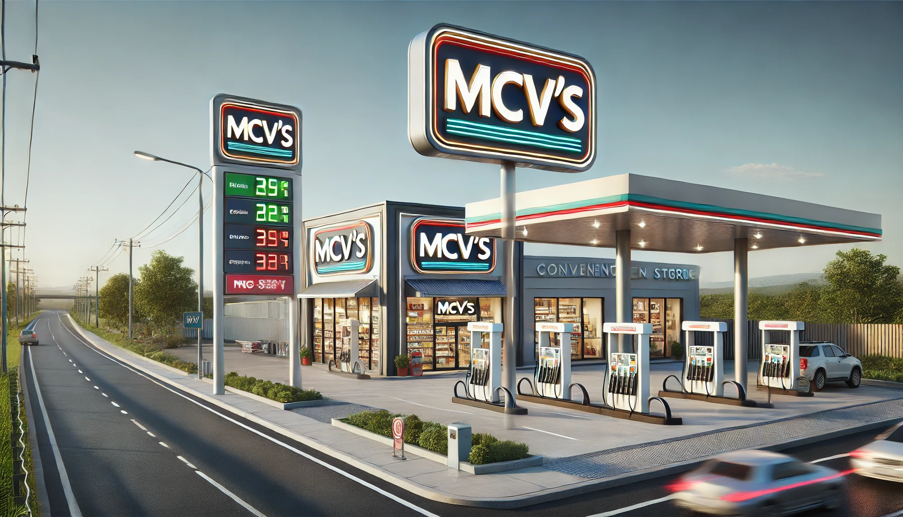
A convenience store with gas pumps is a retail location that combines the sale of everyday convenience items with the ability to refuel vehicles, offering a one-stop solution for on-the-go customers. These stores are typically located near highways, in suburban areas, or at high-traffic intersections, catering to drivers looking for quick access to fuel, snacks, beverages, grab-and-go meals, and essential items. In addition to fuel services, many of these stores feature amenities such as restrooms, coffee stations, and lottery ticket sales, making them a hub for quick errands and travel needs. Their dual-purpose design emphasizes efficiency and accessibility, serving as a cornerstone of the convenience retail market.
* These locations usually have loyalty cards for their customers (some with offers from local supermarket chains)
Combo convenience store and gas station chains dominate the landscape of fuel and quick-stop retailing, offering both fuel services and a wide array of convenience items. Leading examples include Racetrac, known for its spacious stores and extensive food and beverage offerings, and Chevron and Texaco, which combine their trusted fuel brands with compact c-store formats. AM/PM, owned by BP, is recognized for its value-driven approach and popular snack and beverage selections. Maverik, branded as “Adventure’s First Stop,” focuses on outdoor enthusiasts with unique store themes and hearty grab-and-go options. Sheetz and Wawa are standout players in the industry, both offering robust made-to-order food programs alongside fuel and everyday essentials, elevating the customer experience with quality and convenience. These chains are strategically located to attract both daily commuters and long-distance travelers, making them integral to the convenience retail sector.
The National Association of Convenience Stores (NACS) is the leading trade association representing the convenience and fuel retailing industry, serving retailers, suppliers, and stakeholders worldwide. It provides resources, advocacy, and networking opportunities while hosting the annual NACS Show, the premier event for showcasing industry trends, innovations, and best practices.
The Truck Stop

A truck stop is a specialized rest and service area located along major highways, designed to cater to the needs of truckers, RV travelers, and regular drivers. These facilities typically feature large parking areas for semi-trucks, fueling stations offering diesel and standard gasoline, and amenities such as showers, restrooms, laundry services, and driver lounges for long-haul truckers. For RV’ers, truck stops often provide RV-friendly fueling options, dump stations, and convenient parking spaces. They also serve regular drivers with convenience stores, quick-service restaurants, and rest areas, making them a vital stop for travelers of all kinds. In the United States alone, there are thousands of truck stops, ranging from small independent operations to large chains like Love’s Travel Stops, Pilot Flying J, and TA-Petro, providing essential services and facilities for millions of travelers each year.
The truck stop industry is dominated by major chains such as Pilot Flying J, Love’s Travel Stops, and TA-Petro, which collectively operate thousands of locations across the United States, offering extensive services for truckers, RV travelers, and regular drivers. These chains are known for their comprehensive amenities, including fuel stations, truck maintenance facilities, quick-service restaurants, showers, and overnight parking. In addition to these corporate giants, truck stop buying groups like Roady’s Truck Stops play a crucial role, bringing together independent truck stops under a shared brand to enhance purchasing power, marketing, and operational support. Independent truck stops, which make up a significant portion of the market, often cater to local or regional clientele with unique offerings and personalized service. Together, these entities provide a wide range of options for travelers, ensuring convenience, comfort, and essential services for all who rely on America’s highways.
NATSO (National Association of Truckstop Operators) is the premier trade association representing truck stops and travel plazas across the United States, advocating for the interests of these businesses in areas such as transportation, fuel, and convenience retailing. It provides members with resources, education, and networking opportunities, including its annual NATSO Connect conference, which showcases innovations and trends in the travel plaza and truck stop industry.

Coming Soon - We are creating the first YouTube Network Specific to the Trucker Community.We will have most of the key Trucker Youtubers all in one place for you to browse through. www.TruckStops.TV
The Service Plaza (Turnpikes/Toll Roads)
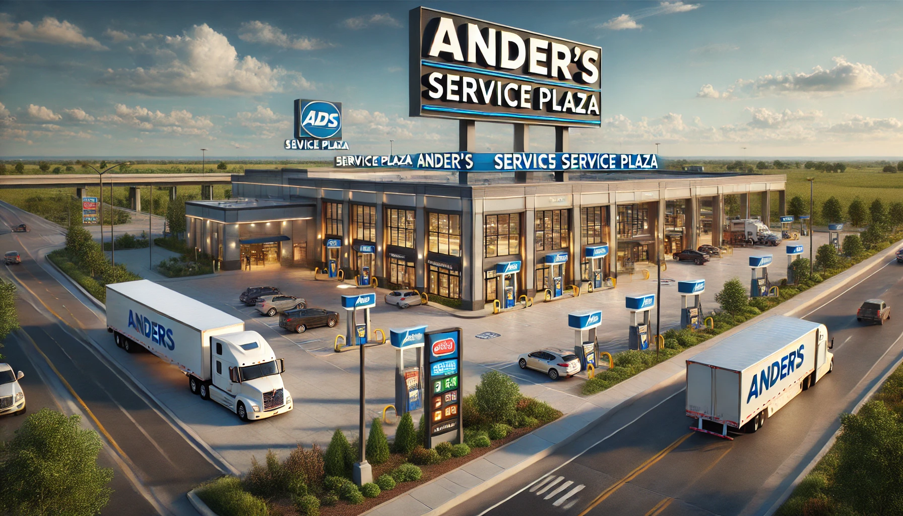
A Service Plaza is a designated rest area located along turnpikes and major toll roads, offering a convenient stop for travelers to refuel, dine, shop, and rest. These facilities are strategically designed to cater to motorists, commercial drivers, and long-distance travelers, providing essential services such as fuel stations, restrooms, and food options. Service Plazas are often home to branded food service and retail partners, including nationally recognized fast-food chains, coffee shops, convenience stores, and souvenir shops, ensuring a consistent and familiar experience for customers. Found primarily on toll roads across the United States and internationally, these plazas are typically spaced at regular intervals to serve travelers’ needs without requiring them to leave the highway, making them a vital part of the transportation infrastructure.
Service plazas on U.S. turnpikes are primarily operated by state agencies or private companies contracted by the state. These operators often partner with nationally recognized food service and retail brands to provide consistent and familiar services to travelers. For example, the Pennsylvania Turnpike Commission leases service plaza spaces to various vendors, including Sunoco for fuel and Applegreen for food services. Wikipedia
Similarly, the New York State Thruway Authority collaborates with multiple branded partners to serve motorists. These service plazas are commonly found along toll roads in states such as Pennsylvania, New York, Ohio, and New Jersey, offering travelers convenient access to essential services without leaving the highway.
The Military Shoppette
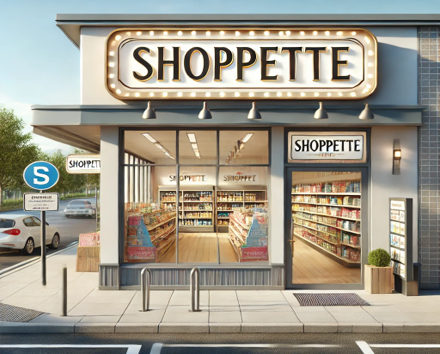
A Military Shoppette is a small convenience store located on military installations, designed to provide service members, their families, and authorized personnel with quick and convenient access to everyday essentials. Found on bases across the United States and overseas, these stores offer a range of products similar to regular convenience stores, including snacks, beverages, toiletries, and household items, often at competitive prices. Shoppettes are operated by entities such as the Army and Air Force Exchange Service (AAFES), the Navy Exchange Service Command (NEXCOM), and the Marine Corps Exchange (MCX). While they function similarly to civilian c-stores, Military Shoppettes cater specifically to the unique needs of the military community, often including tax-free pricing and proximity to other base services.
Military Shoppettes are operated by specialized organizations within the Department of Defense that manage retail services for military communities. Key operators include the Army and Air Force Exchange Service (AAFES), which serves Army and Air Force installations worldwide; the Navy Exchange Service Command (NEXCOM), which operates stores on Navy bases; and the Marine Corps Exchange (MCX), which serves Marine Corps bases. These operators are non-appropriated fund organizations, meaning they rely on profits rather than taxpayer funding to support their operations. Profits are reinvested into programs and services that benefit the military community, such as Morale, Welfare, and Recreation (MWR) activities. Each operator ensures that their Shoppettes are tailored to the specific needs of their respective branches, providing not only convenience but also a sense of community and support for military personnel and their families.
Alternative C-Store Formats
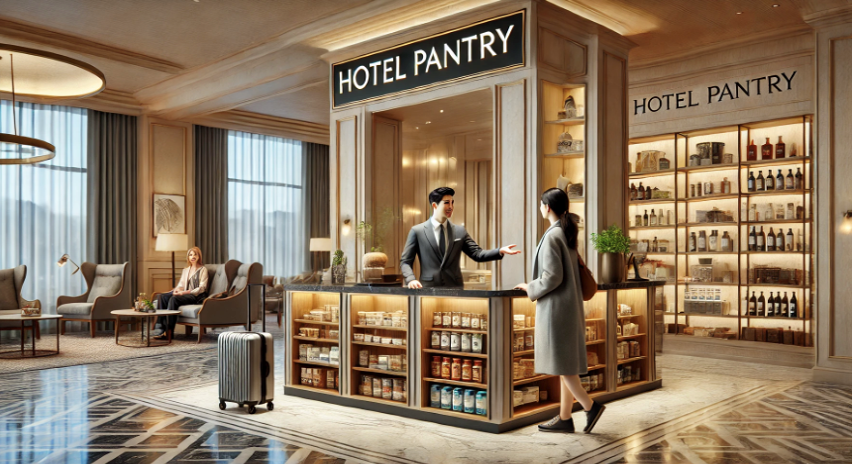
The C-Stores Network has a rich history, dating back to the early 1990s, when its founders co-developed the concept of the Hotel Pantry. A hotel pantry is a small, self-service retail area located within a hotel, offering guests convenient access to snacks, beverages, quick meals, and travel essentials, often operating 24/7. This innovative concept transformed the guest experience by bringing the convenience of a c-store into the hotel setting, eliminating the need for guests to leave the premises for minor purchases. Over the years, the C-Stores Network has played a key role in shaping the distribution model for hotel pantries, partnering with key distributors and suppliers to streamline product delivery. This model ensures that hotels, regardless of size, have access to a consistent supply of popular items tailored to their guests’ needs. Today, the C-Stores Network continues to innovate by connecting hotels with emerging brands and creating efficient DSD (Direct Store Delivery) partnerships to keep hotel pantries well-stocked and relevant in a rapidly evolving hospitality market.
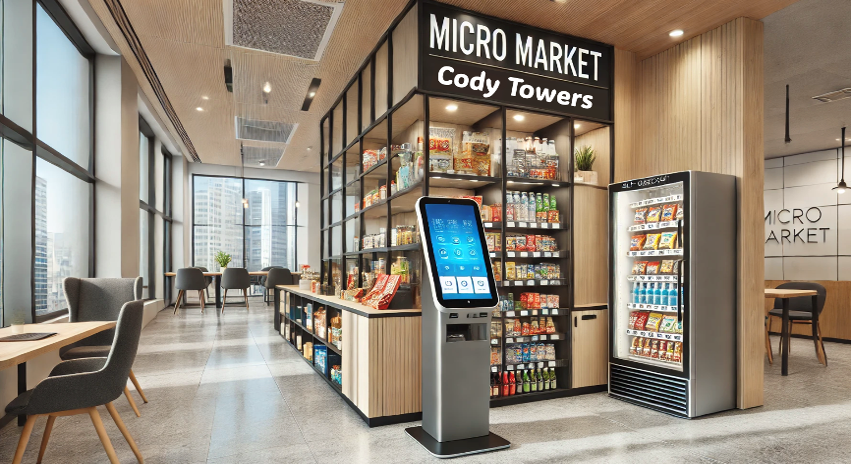
The creation of the Hotel Pantry concept, co-developed by the founders of the C-Stores Network, laid the groundwork for the later emergence of the Micro Market retail model. A Micro Market is an unattended retail space featuring open shelving, refrigerated coolers, and self-checkout kiosks, offering a wide selection of snacks, beverages, and meal options. Unlike traditional vending machines, micro markets provide a more expansive and convenient shopping experience, catering to busy professionals and travelers. This retail model can now be found in various locations such as office buildings, factories, airports, and other high-traffic environments where convenience and variety are essential. By applying the lessons learned from the Hotel Pantry’s success, the founders of the C-Stores Network helped shape a retail format that meets the evolving needs of modern consumers in diverse settings.
* Micro Markets are usually managed by vending distributors and office coffee service providers.
The College C-Store
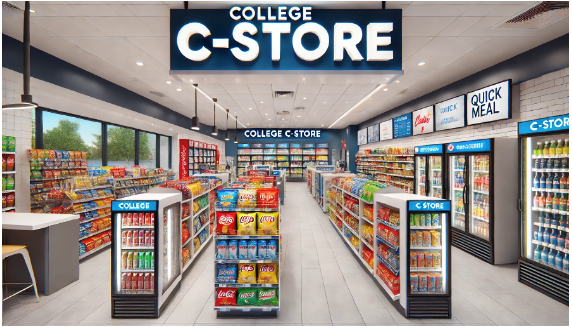
The Marina Mart
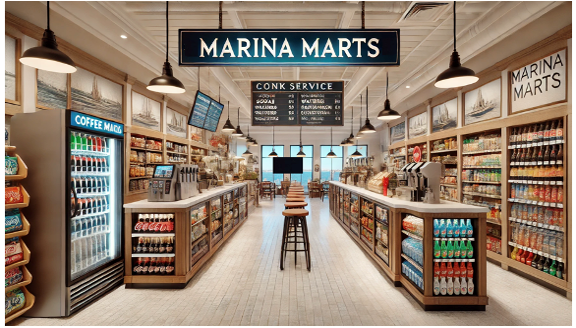
The Sundry Shop
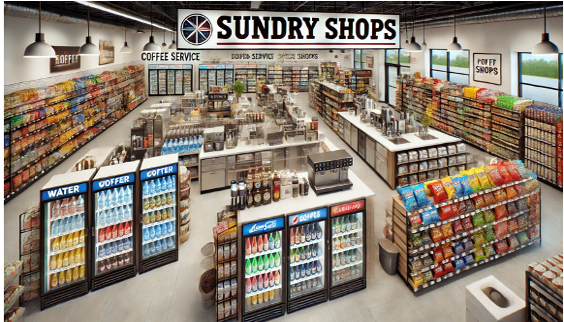
The Lobby Shop
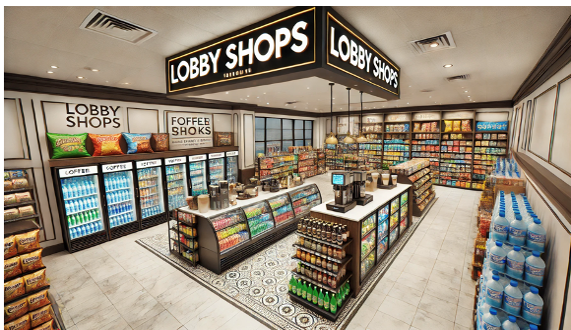
The Camp Mart
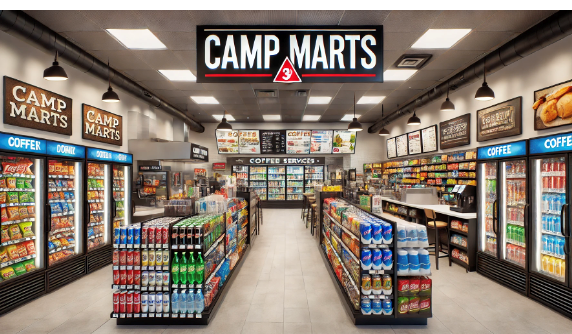
The Hotel Pantry

Gift Shops

Gift Shops are specialized retail spaces that cater to the unique needs and interests of their respective audiences, blending elements of a convenience store with a focus on souvenirs, essentials, and specialty items. Found in diverse locations such as hotels, airports, hospitals, zoos, aquariums, theme parks, water parks, tourist sites, museums, duty-free zones, government buildings, and national parks, these shops are tailored to their environments and customers. For instance, a hotel gift shop may provide travel essentials, snacks, and local souvenirs, while a museum shop focuses on educational materials, artwork, and themed merchandise related to exhibits. Similarly, a zoo or aquarium gift shop might feature animal-themed toys, apparel, and books, appealing to families and children.
Beyond their role as souvenir outlets, Gift Shops also serve as convenient stops for immediate needs, much like traditional convenience stores. At airports and hospitals, they offer snacks, beverages, and personal care items, helping travelers and visitors manage unexpected necessities. In national parks, these shops might sell trail maps, outdoor gear, and locally crafted goods, catering to hikers and nature enthusiasts. Tourist attractions and theme parks often include gift shops stocked with exclusive branded merchandise, ensuring visitors leave with a memorable keepsake. By combining convenience with a curated shopping experience, gift shops play a pivotal role in enhancing customer satisfaction and generating revenue for their host locations.
